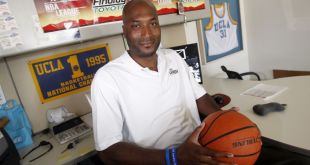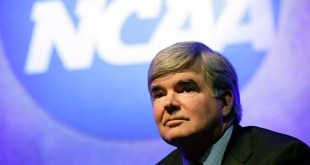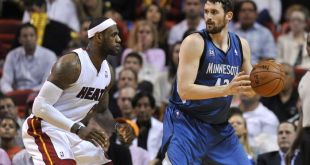The United States District Court for the Southern Division of Indiana ruled on Berger vs. NCAA, in what was a very interesting, if unheralded decision. This particular case involved the questions of whether or not student-athletes are employees under the Fair Labor Standards Act and if so, whether or not the NCAA and its membership institutions were violating the FLSA by failing to pay the student athletes minimum wage.
Read More »The Great Escape: The NCAA Receives a Tremendous Ruling for Now and The Future in The O’Bannon Appeal Decision
On Wednesday, September 30, 2015, the Ninth Circuit Court of Appeals issued an opinion on the NCAA’s appeal of O’Bannon vs. NCAA. The decision was a massive win for the NCAA, and for a number of reasons, the decision was a massive defeat for proponents seeking increased compensation for student athletes.
Read More »Dirty Laundry: The Violence the NFL Doesn’t Want You to Know About
The first in a three-part-series on the fan-experience at stadiums across the country examines a disturbing trend of violence at NFL stadiums. The potential liability for teams and stadium owners, let alone the devastating injuries suffered by fans, causes one to question why the NFL, its teams, and the media seem more concerned with PR issues related to violence instigated by players, as opposed to the likely far more widespread fan on fan violence occurring weekly in NFL stadiums.
Read More »Should Mr. Met be Replaced by Sexual Harassment Panda? A Look at the Legal Framework Surrounding the Allegations Levied Against the Mets and Jeff Wilpon.
On Wednesday, September 10, 2014, Leigh Castergine filed a complaint against the New York Mets and Jeffrey Wilpon in the United States District Court for the Eastern District of New York claiming Wilpon and the Mets discriminated against her on the basis of sex, pregnancy, and familial status. This news was essentially buried under a news day involving new Ray Rice video footage and talking heads trying to determine whether or not Danny Ferry is just a little bit racist or racist enough to be fired for his comments regarding Luol Deng. This article will attempt to shed more light on an intriguing news story which was essentially skipped over.
Read More »The Curious Case of Ed O’Bannon: How the NCAA Managed to Lose Almost Every Point in the Landmark Case and Still Avoid Having to Make Any Sweeping Changes.
On Friday, August 8, the first decision in a wave of litigation against the NCAA hit the shores. The decision by Judge Claudia Wilken of the United States District Court for the Northern District of California is both important and intriguing. The decision is the first time in major litigation that a court has not given deference to the NCAA’s commitment to amateurism when those regulations seem to conflict with antitrust laws. The decision has been hailed by many as “the death of amateurism;” however, a close analysis will show that statement to be a minor exaggeration. In reality, it will merely force the NCAA to make better and more reasoned arguments for what it does.
Read More »Show Cleveland Some Love! The Mechanics of a Wiggins Love Trade.
Recent media reports have suggested that in addition to ongoing trade talks with Minnesota for superstar power forward Kevin Love, Cleveland has only recently made #1 overall draft pick and fashionable lothario Andrew Wiggins available in such trade talks. So let’s forget about ‘would they,’ ‘should they’ make this trade and focus on ‘could they?’ Let’s assume the trade is going down, and lets assume it does include Andrew Wiggins (a trade which would vastly alter the landscape of the NBA).[i] This article will break down the CBA rules regarding trades and salaries, and give a couple possible pictures of what such a trade could look like under the CBA rules.
Read More »The Curious Case of Chandler Parsons or the Time Daryl Morey Got Too Smart For His Own Good
Perhaps not entirely lost amidst the LeBron decision and an endless stream of “I’m Coming Home” YouTube montages, was a curious series of events regarding NBA up-and-comer Chandler Parsons. What doesn’t make sense is this: If Houston knew they would not match a max offer sheet for Parsons, why decline the team option? They could have kept him cheap for one more year and then made their best offer in unrestricted free agency. Given how well Parsons had played and developed, Houston had to know a large offer sheet designed not to be matched was going to come his way and so the only reason to decline the team option was if you were planning on matching any offer sheet.
Read More »HOW OLD IS OLD ENOUGH? AN OVERVIEW OF DRAFT AGE RESTRICTIONS IN THE NBA
Momentum is growing for a change to the NBA draft age restrictions. But, in order to discuss or construct ideal draft eligibility requirements requires an understanding of the relevant law, past challenges to such requirements and the structures other sports have used.
Read More »Company Towns, Finance, and the Sensationalist Zeitgeist Against the NCAA
The comparison of the NCAA to a Plantation is sensationalist and inappropriate. A more apt comparison is to that of the Company Town. This post takes a deeper look at the money in collegiate athletics.
Read More »Guilty By Association: Joint Employer Doctrine and Why the NCAA Should Tread Lightly Regarding the Northwestern NLRB Decision
So the Chicago regional office of the NLRB ruled that Northwestern is an employer and that its football players are employees who may elect to form a union. The decision however did not directly address the NCAA. At first glance the NCAA may not be bound by this decision since it is not labeled as the “employer.” However, what is to stop the NCAA from deploying its nuclear option and simply creating a bylaw stating that any player in a union or any player who is an “employee” is ineligible for competition. Well, there are two main obstacles, one from a practical perspective, and another from the legal side. Let’s begin with the legal element.
Read More » The Sports Esquires Putting Sports on Trial
The Sports Esquires Putting Sports on Trial




